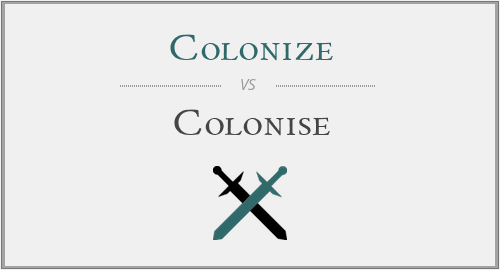The Greeks colonized Sicily and southern Italy.
Our organization is seeking to protect the rights of the newly colonised people.
Which of the above two sentences is correct? What are the right spellings are of colonize? If you are having doubts while answering these questions, keep reading this article and all your doubts will vanish in thin air.
Colonize as verb:
Colonize is used as a verb in English language which means to send settlers to (a place) and establish political control over it.
The third world countries are sending over refugees to colonize the undiscovered parts of the world.
To settle among and establish control over (the indigenous people of an area) is also known as colonize.
They sought to discredit the peoples they were colonizing.
Colonize is also used in a sense of appropriate (a place or domain) for one's own use.
A small town in a part of the Hudson Valley fast being colonized by weekenders.
In Ecology, colonize is related to a plant or animal establish itself in (an area).
Mussels can colonize even the most inhospitable rock surfaces.
Use of Colonise:
The original and old spellings of the word are with an s and are used extensively in British English. If you are writing for a British audience or you are a Brit by heart you can use these spellings.

Examples:
Told from the perspective of the Moroccan slave Estebanico, mentioned in passing in official accounts, it depicts the doomed saga of the Spanish conquistador Pánfilo de Narváez who, in 1527, led an expedition to colonise Florida, which led to horrendous consequences for the unprepared settlers. (The Guardian)
However, what is deeply sad about the move is that it has ignored the painful history of South Africa, the many wars our people, black and white, fought against the English and all those who sought to colonise us. (The Sunday Independent)
Use of Colonize:
The new revolutionized spellings of the word are with a z instead of an s and are used in American English. People who are Americans and those writing for American audience choose these spellings. These spellings are gaining a lot of popularity throughout the world including countries like Canada.
Examples:
The second man on the moon is teaming up with the Florida Institute of Technology to develop a master plan to colonize the red planet in less than 25 years. (TIME)
Whether your desire is to someday sell the business, become rich and famous, overtake Facebook, or colonize Mars, you must both possess a shared goal. (Forbes)
So the Spanish king gave Mendendez, one of his most experienced admirals, two main tasks: first drive the French out and then colonize and evangelize La Florida. (The Florida Times-Union)
Colonize or colonise:
Colonize means to send citizens to a different land to establish a settlement and thereby establish political control for the home country. Colonize may also refer to establishing plants or animals in a new habitat. Colonize may be used as either a transitive verb which is a verb that takes an object, or an intransitive verb, which takes no object. The North American spelling is colonize, related words are colonizes and colonized, the adjective colonizable and the nouns colonizer and colonization. Colonise is the preferred British spelling. Related words are colonises and colonised, the adjective colonisable and the nouns coloniser and colonisation. The American spellings are also considered correct and are gaining acceptance around the world








Have a discussion about this article with the community:
Report Comment
We're doing our best to make sure our content is useful, accurate and safe.
If by any chance you spot an inappropriate comment while navigating through our website please use this form to let us know, and we'll take care of it shortly.
Attachment
You need to be logged in to favorite.
Log In